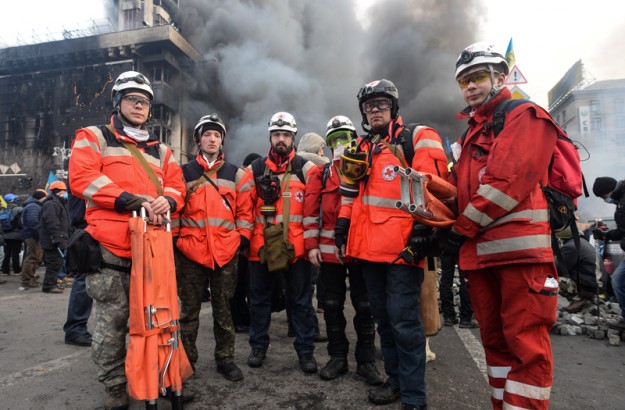
Red Cross Reportage: Ukraine, people in need of humanitarian aid
As the situation in Ukraine continues to be fragile, Ukrainian President Petro Poroshenko and Russian President Vladimir Putin agree that humanitarian aid must reach the people affected by the conflict.
Fighting in eastern Ukraine has claimed over 6,000 lives, with almost half the population in the region displaced. Elena Aleksandrovna, currently seeking shelter in a dormitory in Donetsk National University in Eastern Ukraine, is one of many internally displaced people. With no homes, no means of livelihood, she helplessly says, “We are fully dependent. We do not receive pension. We are old and dependent. Small kids, my grandchildren. We are six here. Granny, my husband and I, my two grandchildren and my daughter. We sleep on the floor.”
Echoing her sentiments, Oksana who is also in the same dormitory says, “The majority here are people in need. Elderly, very old people. Families with children. Children can survive without candies. The most important for us are medicine and hygiene items. The most vulnerable need some food items, tea, sugar, butter. My understanding that things are getting worst. All the fields have been set to fire. No harvest is expected. So, Donbass will be starving.”
ICRC President Peter Maurer today completed high-level talks in Moscow and Kiev, in which he focused on the severe humanitarian crisis in eastern Ukraine and urged the governments of both countries to ensure that vital aid reaches people in need – people like Elena and Oksana. During a four-day visit to the region, he met with President Vladimir Putin and President Petro Poroshenko, and senior officials of both countries.
Hospitals, schools and other key infrastructure have been badly damaged and essential services disrupted. This, coupled with the existing economic crisis in the region, means that reconstruction is a daunting task. The effects of the conflict will be felt for years to come.
Highlighting his concerns, Peter Maurer says, “Because of the fighting in Eastern Ukraine, there has been direct impact on the civilian population. The usual humanitarian needs that emerge in such situations have also emerged in Eastern Ukraine. It is food, it is water and sanitation, and of course it is health services which are lacking. Health services in particular because many of the hospitals and health facilities have been damaged. Even if the ceasefire will hold, what we are all hoping for, needs will remain equally big in 2015 and ICRC will continue to respond.”
Since the onset of the hostilities, the ICRC has been striving to work on both sides of the front line, bringing aid to those in need and urging all parties to spare the civilian population and infrastructure. But addressing existing needs will require a concerted effort by all sides.


